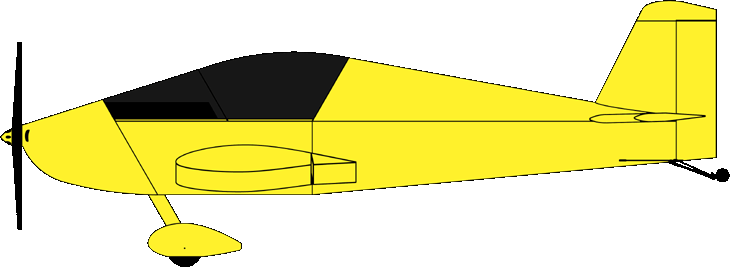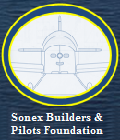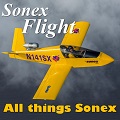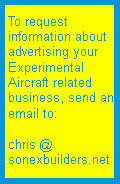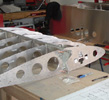


random user submitted photo
Insurability?
14 posts
• Page 2 of 2 • 1, 2
Re: Insurability?
LarryEWaiex121 wrote:If the plane isn't manufactured according to the plans, i.e. your own brand of engine, modified fuel tanks and pumps, non conforming airframe modification, then the unit doesn't qualify as a Sonex in terms of insurance. It's a custom and should be treated as such.
FWIW, I tried to honor the factory request to not use their name on my build. It's actually registered as a "Myunn" but the registration still shows the name of the kit supplier. But does this mean that everyone that added wing tanks now has to rename their plane? 8-)
LarryEWaiex121 wrote:The simple fact is too many unproven mods are being done, with low experience pilots doing their own test flying. Things go wrong and they are not qualified to handle the results.
This is true for every modified kit plane regardless of the supplier so this point would not specifically apply to our planes.
LarryEWaiex121 wrote:Vans has vastly more airframes in the air but casual observation tells me that they have a proportionally lower rate of engine/fuel related failure than Sonex airframes. Even if the actual difference is small, the perception is hugely NOT if favor of the Sonex. I've heard this many times from my flying friends. The old saying is, "perception is reality". I know locally 4 Vans owners that looked at the Sonex and passed on it because they felt the recommended engine packages were not acceptable to them. Out West, for many the Aero-vee is a complete non starter do to density altitude most of the year.
To my knowledge there isn't a single Van's aircraft flying with a converted VW engine (I realize the VW doesn't make enough power) but the point is that most Van's builders are using aircraft engines and not auto conversion engines. Still, some are using Subaru engines and such.
But your point is clear even if others do not realize the impact of it. Look and see the total number of threads all over the web about the overheating of the VW conversions (not just on these airframes) and the extreme difficulty of setting up the factory supplied slide carb. The little VW engines work well but there is a limit to how much power it can produce and how much heat it can stand. Personally I believe the 80 HP VW engine is very taxed in the hotter southern states. Some have mentioned moving the sensors to get a better CHT reading but that's not addressing the problem.
FWIW (again) my insurance on my 120 HP tail wheel airplane had a very small increase over last year (~$20) and my overall cost is under a grand for a newbie tail wheel pilot, 25K in hull, and the standard liability. I've read how WW worked with insurance companies to get approval for his conversions on experimental aircraft. When I applied for my insurance policy I was very upfront about the type of engine I had, the factory stance on the FWF weight limit, and the fact that I had increased the gross weight over the factory recommended limit by ~8%. They thanked me for my candor and noted these things on my policy.
Dunno if this helps ...
Dale
-

daleandee - Posts: 877
- Joined: Fri Feb 01, 2013 6:14 pm
Re: Insurability?
I believe I stand with a considerable number of people involved in the Sonex community that not only has a vested financial interest in the planes image but a larger interest in slowing the accident rate because of the human toll it takes.
It pains me to read about events that probably in large part could have been avoided with more refinement and care in building and maintenance. More sets of eyes reviewing and confirming whats been done. Qualified advisors and not just well wishers that eat all your chips and drink your beer.
The engine and fuel system "has to work". Till a builder has time on the stick and knows his aircraft, this is no place to experiment. My personal feeling. There is enough pressure to sort out a new plane without dealing with a firewall forward mystery world. If a person does go this direction, I feel it behooves them to have an experienced test pilot fly the plane for the first flights. If something is going to go to "you know where" it's likely going to be in the early running.
Case in point. This last week at my home airport we had a guy with a brand new $60,000 gyro wad it up. First flight, second landing. Came in too steep, flared late and cratered it into the runway hard enough to rip off the tail, collapse the right gear, tip the whole unit over and wiped out the main mast, blades and everything in-between.
Got his add on rating in a similar type of gyro but no actual experience in that type. Huge insurance claim. Basically totaled. Not to mention the image it creates about those pesky little "experimental" aircraft. The airport was closed and it kept the Citations and Gulfstreams parked. Boy that pissed off the high dollar crowd.
Larry
It pains me to read about events that probably in large part could have been avoided with more refinement and care in building and maintenance. More sets of eyes reviewing and confirming whats been done. Qualified advisors and not just well wishers that eat all your chips and drink your beer.
The engine and fuel system "has to work". Till a builder has time on the stick and knows his aircraft, this is no place to experiment. My personal feeling. There is enough pressure to sort out a new plane without dealing with a firewall forward mystery world. If a person does go this direction, I feel it behooves them to have an experienced test pilot fly the plane for the first flights. If something is going to go to "you know where" it's likely going to be in the early running.
Case in point. This last week at my home airport we had a guy with a brand new $60,000 gyro wad it up. First flight, second landing. Came in too steep, flared late and cratered it into the runway hard enough to rip off the tail, collapse the right gear, tip the whole unit over and wiped out the main mast, blades and everything in-between.
Got his add on rating in a similar type of gyro but no actual experience in that type. Huge insurance claim. Basically totaled. Not to mention the image it creates about those pesky little "experimental" aircraft. The airport was closed and it kept the Citations and Gulfstreams parked. Boy that pissed off the high dollar crowd.
Larry
- LarryEWaiex121
- Posts: 213
- Joined: Wed Sep 04, 2013 5:53 pm
Re: Insurability?
I agree Larry. I'm an EAA Flight Advisor and like helping people get ready for a first flight. But more often than not, I recommend a Test Pilot. I've flight tested a dozen new homebuilts but always recommend a qualified person. I did a test flight on a newly restored Kitfox a few weeks back and had an engine fail (actually a prop) on takeoff. I made the 'impossible' turn back to a parallel runway much to the surprise of onlookers. But I pointed out I have 1000 hours in that exact M/M and engine so I was prepared and knew my point of no return. I was fully aware of my speed/pitch attitude the ENTIRE time. Mostly because I have done it hundreds of times, in practice and training. This is where we need help. Training, training, training. Just like your Gyro pilot example. Its no wonder rates are so high.
No matter what the failure, the resulting stall/spin are what usually kills people. Training, training, training...
No matter what the failure, the resulting stall/spin are what usually kills people. Training, training, training...
- Scott Todd
- Posts: 374
- Joined: Mon Jun 24, 2019 7:40 pm
- Location: Chandler, AZ
Re: Insurability?
Last I heard, GA pilots average around 20 hrs a year.
I realize that I may be sounding like a contrarian, or just a jerk, but more training isn’t going to happen. Sure some people will train more, but those people probably aren’t the ones affecting insurability.
We are often told that if we don’t make changes ourselves, the FAA will force changes. I don’t disagree with that, but I suspect if that happens, many pilots will simply give up, and find another hobby. Any FAA enforcement would require hiring an instructor to ride along while training/practicing; an honor system is unlikely.
I try to perform a stall or two every couple flights, and my EAA chapter has challenges like losing the least altitude on an simulated engine out 180. We report out numbers the following meeting.
While simplicity is often touted as being superior, I wonder if that’s still the case when fuel injection being so ubiquitous.
Speaking simply for myself, I would be less likely to change the design of a fuel system if no one was having problems with “burps”, high and uneven EGTs, cold starts, and tuning in general. As it is, I copied Jeff Schulz’s fuel system design, and have never has a single “burp”.
A supported fuel injected firewall forward option that is designed and tested by the kit manufacturer, I believe could help. I can think of a couple engine outs that would have been prevented, and maybe a couple deaths. I sure wouldn’t have wanted the Rotec TBI that I never ended up using, which has been the cause of several forced landings.
I realize that I may be sounding like a contrarian, or just a jerk, but more training isn’t going to happen. Sure some people will train more, but those people probably aren’t the ones affecting insurability.
We are often told that if we don’t make changes ourselves, the FAA will force changes. I don’t disagree with that, but I suspect if that happens, many pilots will simply give up, and find another hobby. Any FAA enforcement would require hiring an instructor to ride along while training/practicing; an honor system is unlikely.
I try to perform a stall or two every couple flights, and my EAA chapter has challenges like losing the least altitude on an simulated engine out 180. We report out numbers the following meeting.
While simplicity is often touted as being superior, I wonder if that’s still the case when fuel injection being so ubiquitous.
Speaking simply for myself, I would be less likely to change the design of a fuel system if no one was having problems with “burps”, high and uneven EGTs, cold starts, and tuning in general. As it is, I copied Jeff Schulz’s fuel system design, and have never has a single “burp”.
A supported fuel injected firewall forward option that is designed and tested by the kit manufacturer, I believe could help. I can think of a couple engine outs that would have been prevented, and maybe a couple deaths. I sure wouldn’t have wanted the Rotec TBI that I never ended up using, which has been the cause of several forced landings.
Paul LaRue
Sonex N454EE Plans# 1509
Jabiru 3300
First Flight 12/21/2017
http://www.mykitlog.com/lpaaruule
Sonex N454EE Plans# 1509
Jabiru 3300
First Flight 12/21/2017
http://www.mykitlog.com/lpaaruule
-

lpaaruule - Posts: 233
- Joined: Wed Mar 26, 2014 6:33 pm
- Location: SE Michigan
14 posts
• Page 2 of 2 • 1, 2
Who is online
Users browsing this forum: No registered users and 17 guests
